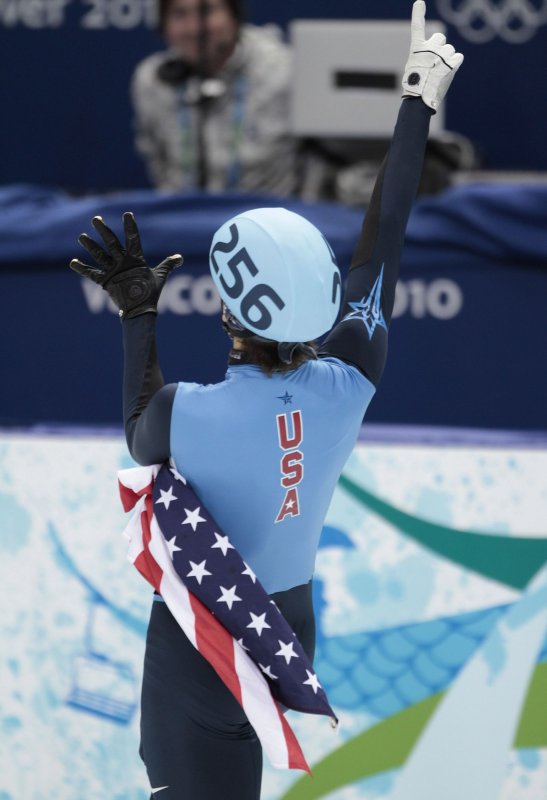1 of 14 | United States' Apolo Anton Ohno holds up six finger after winning his sixth Olympic medal, taking home the silver in the men's 1500 meter Short Track Speed Skating competition at the 2010 Winter Olympics at Pacific Coliseum in Vancouver, Canada on February 13, 2010. UPI/Brian Kersey |
License Photo
VANCOUVER, British Columbia, Feb. 14 (UPI) -- Americans Apolo Anton Ohno and Hannah Kearney led a crowd of Olympic veterans to performances that were generally unsurprising Saturday at the Vancouver Games.
Athletes who were expected to win medals, or at least were given a good chance of doing so, usually did on the first day of the Winter Olympics.
Short-track skating, which almost always produces unbelievable finishes, did not disappoint and even the weather was predictably sour -- creating a significant postponement.
The most unexpected developments turned out to be the fact that the United States led the medal chart and that the luge competition actually got under way on time just one day after an athlete was killed while practicing for the event.
The first two runs of the men's luge were conducted at Whistler Sliding Center, where on Friday an athlete from Georgia died in a horrific crash.
In answer to that tragedy, officials shortened the course, reconfigured a wall and went on with the business at hand. Speeds which had been running in excess of 90 miles per hour were reduced to the mid-80s, something more in tune with what the competitors face at a normal World Cup race. Germans Felix Loch and David Moeller led at the event's midway point.
Ohno, competing in his third Olympics and looking for an American-record equaling sixth medal, got it in bizarre fashion.
Ohno stumbled late in the 1,500-meter short-track race while being passed by eventual winner Jung-Su Lee of South Korea. Two other South Koreans passed Ohno as well and a medal sweep appeared likely for that country.
But the second and third Koreans collided and fell, leaving Ohno and fellow-American J.R. Celski to clean up the silver and bronze medals.
Kearney, meanwhile, won in freestyle skiing moguls over defending champion Jennifer Heil of Canada. Four years ago in Turin, Kearney, as the reigning world champion, messed up her qualifying run and did not even make it to the finals.
American Shannon Bahrke, who won silver in 2002, finished third – giving the United States four overall medals Saturday. No other country had more than two.
The day began with the announcement that rain and slush on the slopes of Whistler Mountain had caused officials to postpone the men's downhill until Monday, adding fuel to the argument of those who have said the threat of warm weather in the Vancouver region could bring nothing but trouble for the alpine races.
Once the competition began, the veterans took over.
Simon Ammann of Switzerland had the honor of winning the first gold medal awarded at the Vancouver Olympics. The Swiss ski jumper won twice in Salt Lake City eight years ago and then saw his career go into decline.
He has returned to form this year and he uncorked a jump of 108 meters in the second round to clinch the victory.
Sven Kramer was perhaps as big a favorite as there was coming into the Olympics. A hero in his native, speed-skating mad country of the Netherlands, Kramer came through as expected.
He won the 5,000-meter race Saturday in the time of 6:14.60, an Olympic record turned in on what has been considered a slow ice surface at the Richmond Oval.















